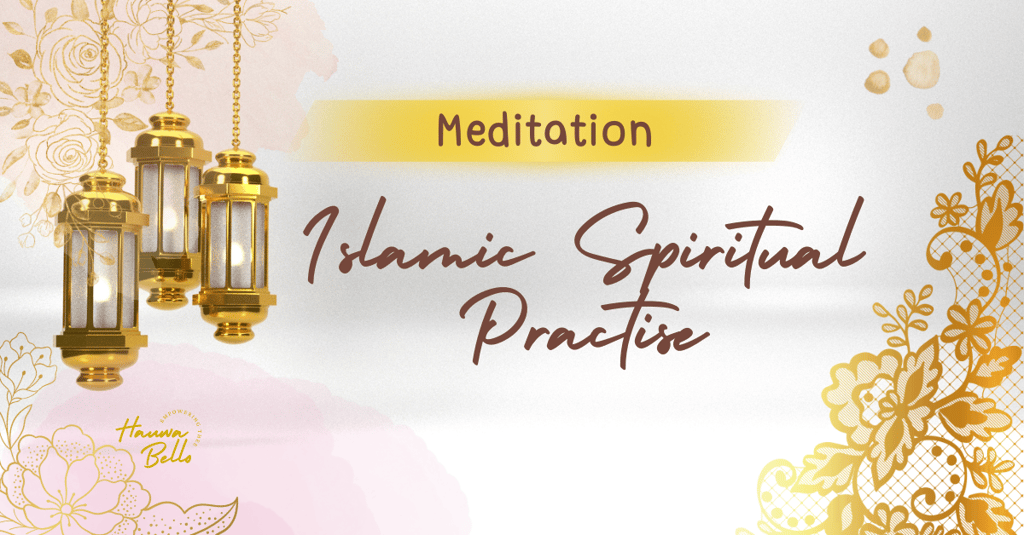Exploring Meditation in Islam: A Journey of Spiritual Connection
This post delves into the significance of meditation within Islam, presenting it as a profound practice of surrender and mindfulness deeply rooted in Islamic spirituality. Highlighting various forms of meditation such as Taffakur (reflection), gratitude, seclusion, Dhikr (remembrance of Allah), and Qur'an recitation, it emphasizes meditation's role in enhancing worship and fostering a deeper spiritual connection with Allah. Through practical suggestions and insights into the benefits of Islamic meditation, the post invites Muslims to embrace this spiritual practice to achieve inner peace, contentment, and a more fulfilling relationship with their faith.
3/9/20242 min read


When we think of meditation, images of serene figures, perhaps monks or zen masters in tranquil surroundings, often come to mind. But what does meditation mean within the context of Islam?
Understanding Meditation Through Islamic Lens
Meditation holds a significant place in Islamic spiritual practice, though it may not always be highlighted as such. At its essence, meditation in Islam is an act of deep surrender and submission to Allah's will, achieved through stillness and a conscious state of mind. This practice, deeply rooted in the history of Islamic spirituality, was engaged in by our predecessors in various forms, enhancing their worship activities such as salaah (prayer), fasting, and dhikr.
Surrendering during meditation means letting go of the ego and acknowledging that control is an illusion. It's a practice of mindfulness, a state of being keenly aware of the present, calmly acknowledging and accepting our feelings, thoughts, and bodily sensations as a path to therapeutic healing.
Meditation offers numerous benefits, including stress reduction, improved memory, enhanced focus, reduced emotional reactivity, and better personal relationships, all contributing to a more contented life. Islamic meditation, in particular, focuses on remembering Allah, aiming to cleanse the heart and mind from negativity.
Practical Ways to Engage in Islamic Meditation
1. Reflection (Taffakur): Taffakur involves intentional, constructive, and positive thinking about Allah's greatness. In an age of constant distraction, dedicating time to reflect can help us address unresolved thoughts and alleviate stress. Beginning with a few minutes of stillness after salaah can open a space for self-reflection and spiritual connection. Watch out for reflective meditation on Allahs' names premiering on my YouTube channel on the first day of Ramadan 2024 in shaa Allah.
2. Gratitude: Practicing gratitude beyond verbal acknowledgements helps solidify this feeling in our daily lives. Keeping a gratitude journal is a recommended practice for embedding this emotion more deeply into our consciousness.
3. Seclusion: Emulating Prophet Muhammad (PBUH), who valued seclusion before his prophethood, this practice allows for personal introspection and spiritual renewal, not just during Ramadan but throughout the year.
4. Dhikr: While commonly practised, dhikr can become a more profound meditation practice by engaging in it mindfully rather than mechanically, enhancing its spiritual benefits.
5. Qur'an Recitation: Engaging with the Qur'an through recitation is a powerful form of meditation, offering a source of comfort and spiritual recharging, especially during challenging times.
Meditation practices complement rather than replace compulsory acts of worship, aiming to deepen and enrich our spiritual lives. Fahmida Zeidan, founder of Yan Taru Learning Centre, encapsulates the essence of Islamic meditation, emphasizing that embracing whatever comes our way as Allah's will empowers us to face life's challenges with courage and peace. Meditation, in this light, is not just a practice but a pathway to meeting the world and its trials with resilience and faith.
Adapted from Fatima Bheekoo-Shah's post on the About Islam page.
Subscribe to my newsletter for articles on holistic living, mental health, mindfulness, faith, and more.



